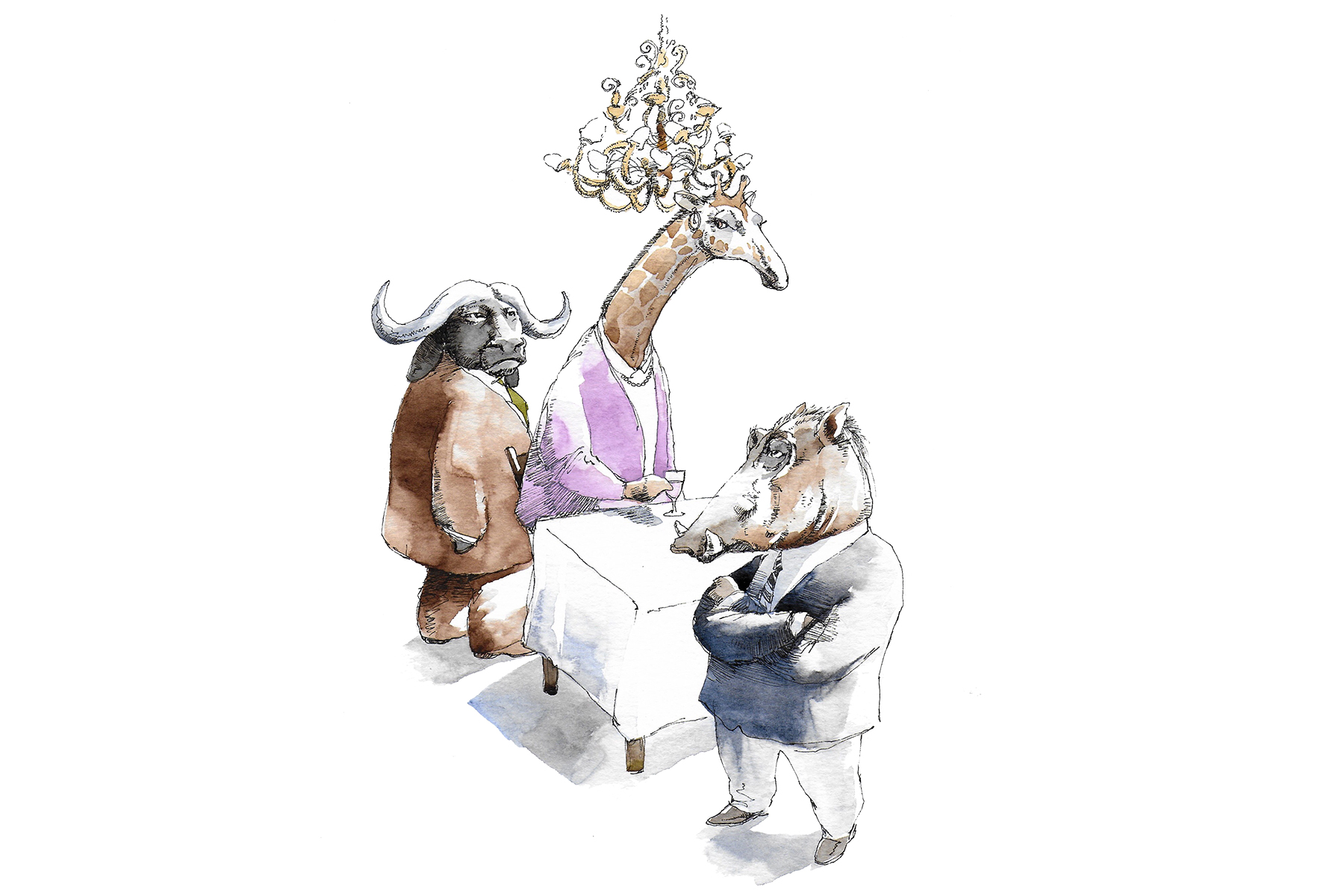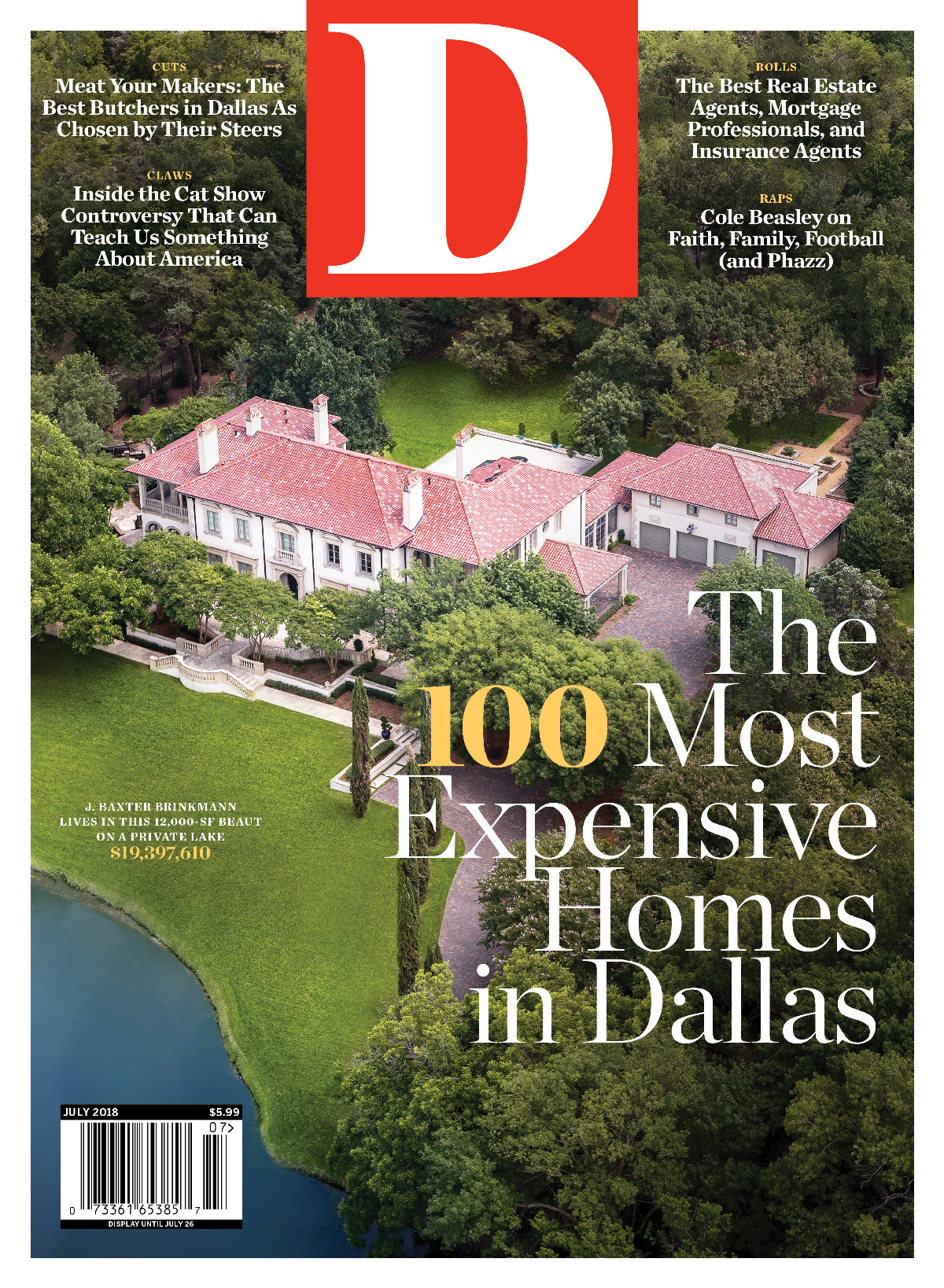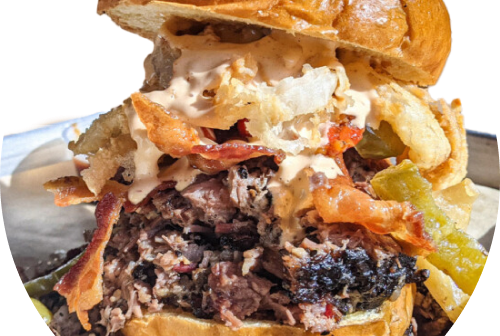As I walked through the warren of Nick & Sam’s, a pair of well-dressed men in the shadowy spot between the front room and the bar talked with drinks in hand. “Well, there goes a giraffe,” one commented to the other as I passed a foot away. Looping back from the bar, I leveled a cool glance at them and said, “Do you think it’s so loud in here that the giraffe can’t hear you?” They seemed startled. The one who had made the remark stiffened and braced as though for a fight. The other pointed vaguely at a table of four men behind him. “They said it!” he lamely lied. I gave them my most withering look and strode away. I haven’t experienced that since college. To be assessed as though you weren’t there is one thing. To have it happen in the civil world of baby grand pianos and complimentary caviar is another.
It’s my job to eat at top-tier restaurants. But in the space of five weeks, for the May cover feature on Dallas’ top steakhouses, I ate in as many as most might in a decade, at a clip of five or six a week. It’s when you get this concentrated dose that you realize—with moral and existential certainty—that this is different from dining at The French Room or Tei-An or Bullion. It’s not a question of fine dining. It’s a question of steakhouses.
My task was to worship at the city’s many dark, wood-paneled temples to T-bones, with their ceremonial presentations of Champagne magnums, Flintstone-size cuts, and humidors of cigars. I was prepared for the playground of carnal decadence. The 45-day dry-aged Akaushi rib-eyes and Courvoisier cream-drenched, porcini-rubbed New York strips. The black-truffle tater tots and marrow-butter gilded mashed potatoes. The spectacles of seafood towers delivered in swirling mists of dry ice and foot-tall slices of impossibly layered cake. I understood the fact that we’ve made a sport of eating so astronomically high on the food chain.
It was everything else that made me bilious.
The kid-gloved mistreatment is not something you notice on the first steakhouse visit. You’re basking in the glow of marbleized protein and the dazzle of a full wall of wine.
No amount of prepping could prepare me for the danger I didn’t expect. The green smoothies I drank to offset the cholesterol in my blood were no match for the assault on my selfhood. In all my dining, I’ve never experienced such a dose of disequilibrium.
In the same week as my giraffe encounter, a server at Del Frisco’s Double Eagle Steakhouse slid my coat-check tab to a man at the table whom I barely knew—as far as I could tell, because he was a man. I fancy myself an independent woman. If there is a zombie apocalypse, I want to grab my own damn coat and run. This, oddly, was my first thought, as the whole table stared at the round, black tab now outside my reach. (I also know more than my fair share about wine. I’d have appreciated it if the server hadn’t whisked the wine list over to my table partner so quickly, where it sat, equally out of reach. “Do you need this?” my guest asked meekly.)
At Al Biernat’s, a young, blond server—who ostensibly did not grow up in the world my mother’s generation did, where her brothers were served larger portions at the dinner table, and women in restaurants might read from a menu printed separately, sans prices—handed me the credit card on which he’d charged several hundred dollars worth of filet mignon and dry-aged Kansas City strip. Without missing a beat, he looked straight at the one man at the table, and shook his hand crisply. “So glad you came in,” said the server, the best hope of the new generation. “Hope to see you again sometime.” My own hand stopped mid-flourish. Was I there? Who exactly was signing this check? Let the record show that I did not adjust the tip, just took note of the insidious association of power, gender, and money.
And there was the evening at Chamberlain’s, when my petite friend and I were ushered to a corner behind a door, where the 3-foot-tall pepper grinder also lived, so that each time the server flew to fulfill a diner’s request for cracked pepper, I ducked as he reached behind me. By the end of the night, I flatter myself that I had the choreography down. Meanwhile, a tableful of men near us talked loudly about the comparative merits of the bodies of female students at two universities. And so it went.
Even at Pappas Bros., my pick for the No. 1 steak restaurant in Dallas, our server initially answered all my questions while looking directly at my friend’s husband. “It’s making me nervous,” he said.
The kid-gloved mistreatment is not something you notice on the first steakhouse visit. You’re basking in the glow of marbleized protein and the dazzle of a full wall of wine. But by number 12 or so, you’re starting to see the patterns, the insistent beat of chauvinistic bias. A few weeks in, it begins to feel like an out-of-body experience. And the reason your stomach is churning each time you put on your heels is less about cholesterol and more about a radical diminishment of self.
What is it about ordering a chateaubriand that sparks some latent chauvinism, some instinct that accompanies the brash machismo of throwing a steak on a wood-fired hearth? There are those who will say I shouldn’t have been surprised, in this universe of female hostesses poured into tiny black dresses, of giant porterhouse and tomahawk steaks, to find imposed gender roles as unsubtle as whiffs of truffle oil, as obtrusive as the massive bones I brought home. (I will add I was making a couple of dogs very, very happy with my piles of cowboy rib-eye spoils.)
But I was surprised. I was surprised as I ate with women whose earning power far outstripped their mates’. I was surprised when I dined with men who ordered no wine and with men who ordered milk. It didn’t matter.
Given an all-female group, it was better. But once even a single, solitary man was present, the differences in treatment surfaced. The hallmarks of the carnivorous boys club, built to flatter a patriarchal ego, came out. Steakhouses wrap us in a cocoon of swaggering indulgence—and we reward them for it.
Was it different, I wondered, for my professional colleagues tasked with visiting steakhouses in Chicago, mecca of steak? Was Dallas a throwback? Could I trade?
I came to appreciate the servers who held the check poised in the middle of the table at the end of a meal, asking us to decide who was going to pay rather than assuming. Never have I so valued the freedom implied in a subtle action. Nor have I ever been so conscious of how small gestures connote power and suggest possibility.
My girlfriends became a welcome chorus of empathetic and flabbergasted responses.
“Tired of steak?” they would ask, seeing me beaten down. Exhausted. More haggard than I should have been.
“No. Tired of misogyny.”
I felt invisible. Which is fine. In my job, it’s in fact best. But in these steakhouse dining rooms, I felt invisible and incensed.
What century are we in? I could begin a catalog of all the microaggressions that over time and through repetition accumulate to something deflating. So many ways to say, “This is not your world.” It took me a while to realize that in the tales I recounted, the people in my entourage saw me living my personal #MeatToo. I’d been too busy assessing the filet and writing scores of notes to analyze the tri-tip’s drag on my psyche.
A few weeks in, I realized my mom was getting the brunt of my disgruntlement. “I don’t know when I’ve heard my daughter so unhappy,” she told a friend. Maybe this was after my three-line email:
Steak is break-ing me.
But I wasn’t miserable, exactly. I was angry. I had my fill of silent bias, and I felt disappointed and sick.
I had been expecting that the advent of the modern steakhouse would have translated into more enlightened approaches. And while this was true in some places—rather than patronizing me, my server at Knife gamely conversed about the more esoteric points of dry-aging; thank you, you’re speaking my language—I had also surmised wrong.
I felt invisible. Which is fine. In my job, it’s in fact best. But in these steakhouse dining rooms, I felt invisible and incensed.
Even gestures of supposed courtesy and respect cloaked the issue. “Would the lady like a black napkin to suit her dress?” What about deeper needs—to be acknowledged, to be perceived as educated, discriminating, curious, capable? If all I need is a swatch of dark linen to avoid mismatched lint, I’m set.
All the women in the world eating long-bone rib-eyes can’t seem to change the landscape fast enough. But if I can do my part by being a woman who writes $4,682.11 in steakhouse checks, fends off louche remarks, and fiercely holds onto her coat-check tab, I’ll do it.
But I wonder, too, about the part we play as I watch, for example, a well-dressed woman wait until her date was in the restroom to ravenously tear with perfectly manicured fingers into the warm loaf in the bread basket.
I think of a beautiful Hudson Valley foie gras I ate, perfectly liquescent and seared, but deluged in sweet balsamic reduction, nonsensical waxy white chocolate curls, and a sweet, one-note Smucker’s-style strawberry jam, the perfect steakhouse example of not knowing what the bells and whistles mean. My five weeks felt a little like that seared lobe of duck liver.
Would it be a good decision to feature my rant in the steakhouse package? No, we decided. Did it affect my evaluation and ranking? No.
But hear this: why should we let anyone get away with assuming so much about women? About what they need. About where power lies. About what they want when they dine.
It was fascinating, in a way, as the energy of #MeToo swirled around me, to be part of a moment in time—a socio-historico-cultural phenomenon and current. It was sobering. It was enlightening.
I’m not sure I ever want to do it again.







